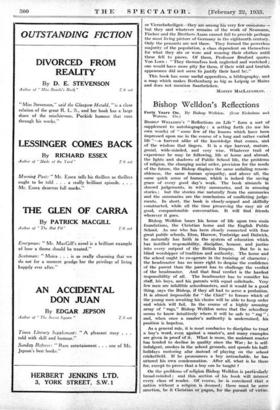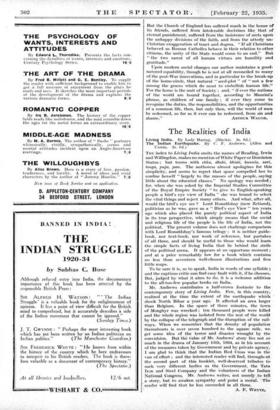Bishop Welldon's Reflections
Banco WELLDON'S "Reflections on Life" form a sort of
• supplement to autobiography : a setting forth (to use his own words) of "some few of the lessons which have been impressed upon me in the course of a In g and rather varied life "—a harvest alike of the knowledge that comes, and of the wisdom that lingers. It. is a ripe harvest, mature, genial, wide-minded, and very wise. Whatever trail of experience he may be following, life at home and abroad, the lights and shadows of Public School -life, the problems of religion, the changing social order, provision for the needs of the future, the Bishop displays the same unfailing reason- ableness, the same htunan sympathy, and above all, the same quick sense of humour, which is indeed the saving grace of every good day's work. The book abounds in shrewd judgements, in witty summaries, and in amusing stories ; but the -stories rise naturally from the summaries and the summaries are the conclusions of conflicting judge- ments. In short, the book is closely-argued and skilfully constructed, while all the time preserving the easy air of good, companionable conversation. It will find friends wherever it goes.
Bishop, Welldon bases his house of life upon two main foundations, the Christian home and the English Public School. As one who has been closely connected with four great public schools, Eton, Harrow, Tonbridge and Dulwich, he naturally has 'faith in the system of education which has instilled responsibility, discipline, honour, and justice into every outpost of the British Empire. But he is no blind worshipper of tradition and authority. The home and the school ought to co-operate in the training of character ; the headmaster has no more right to despise the confidence of the parent than the parent has to challenge the verdict of the headmaster. And that final verdict is the hardest responsibility of all. - The headmaster has to consider his staff, his boys, and his parents with equal solicitude. Very few men are infallible schoolmasters, and it would be a good thing, says the Bishop, if they all had to serve a probation. It is almost impossible for "the Chief" to foresee which of the young men awaiting his choice will be able to keep order and which will fail. In the course of a highly amusing array of "-rags," Bishop Welldon notes that the schoolboy seems to know intuitively where it will be safe to " rag " ; and, when once a master's authority is undermined, his position is hopeless.
As a general rule, it is most conducive to discipline to trust a boy's word, eve,n against a master's, and many examples are given in proof Of it. What is more, the assistant master has tended to decline in quality since the War ; he is self- indulgent, smokes in the school grounds, and spends his half. holidays motoring afar instead of playing on the school cricketfield. If he pronounces a boy unteachable, he has uttered his own condemnation. After all, what is he there for, except to prove that a boy can be taught ?
On the problems of religion Bishop Welldon is particularly broad-minded ; and this section of his book will interest every class of reader. Of course, he is convinced that a nation without a religion is doomed; there must be some sanction, be it Christian or pagan, for the pursuit of virtue. But the Church of England has suffered much in the house of its friends, suffered from intolerable doctrines like that of
eternal punishment, suffered from' the insistence of sects upon the unhappy divisions 'of the faith, and from the utterly un- Christian exaggeration of tenet and dogma. "If all Christians behaved as Roman Catholics behave in their relation to other citizens, the "unity of the State would come to an end." But "the two rarest of all human virtues are humility and gratitude."
Upon modern social changes our author maintains a good- natured equability, though he is not at all reconciled to many of the post-War innovations, and in particular to the break-up of the home-circle, that natural " seed-plat " of "not a few among the graces which do most to embellish human life:' For the home is the unit of Society ; and, "if ever the nations of the world are bound together, according to Mazzini's phrase, as children of one family ; if ever they come to recognize the duties, the responsibilities, and the opportunities of a common life, then, but only. then, will the world of men be redeemed, so far as it ever can be redeemed, from sin and



















































 Previous page
Previous page